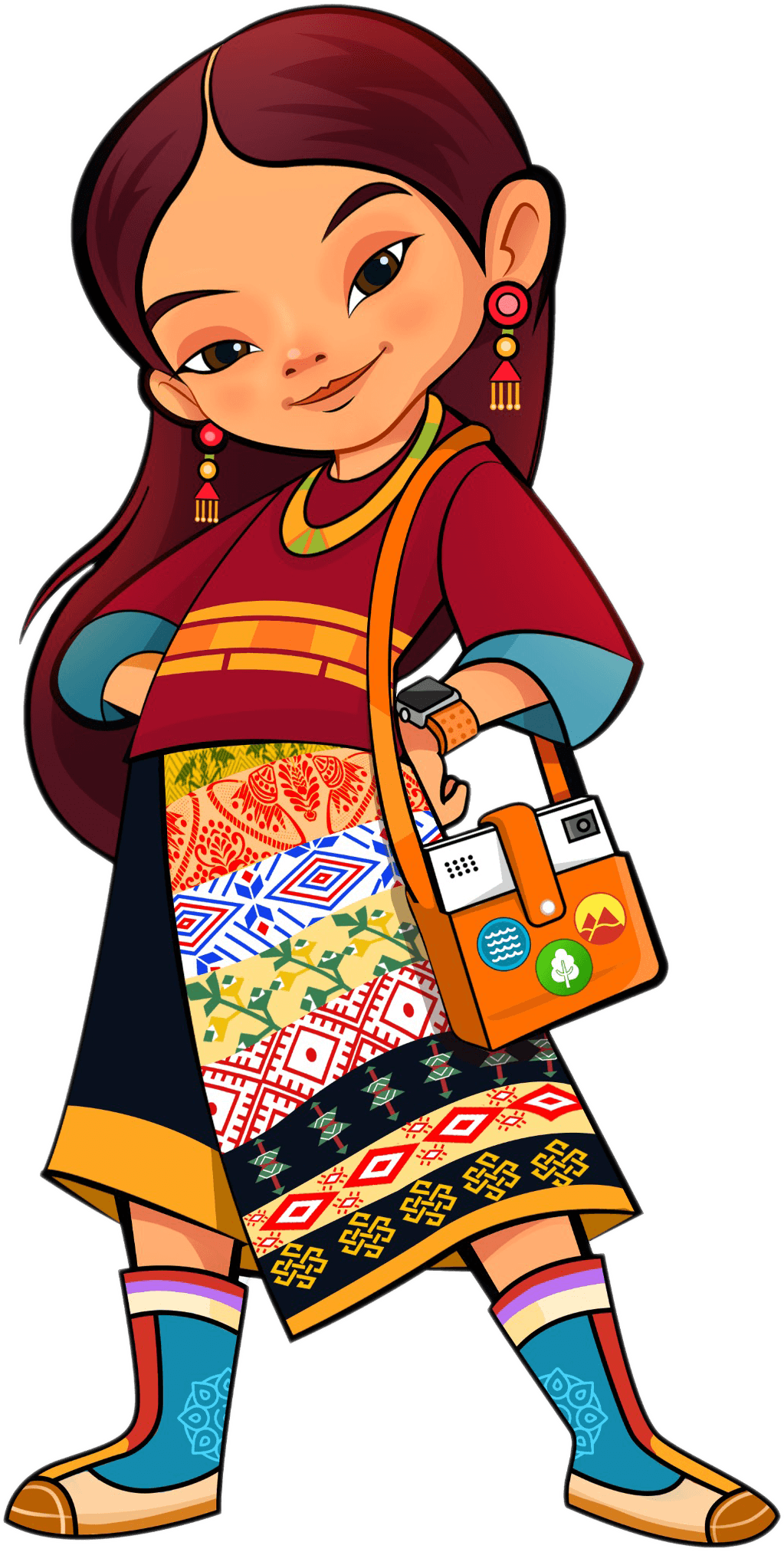 Bharat Mandapam, New Delhi, 110001
Bharat Mandapam, New Delhi, 110001 Bharat Mandapam, New Delhi, 110001
Bharat Mandapam, New Delhi, 110001







Born in the small village of Tirbin in Arunachal Pradesh, India, Jenjum Gadi pursued his studies in Fashion Design at Wigan & Leigh College in New Delhi. Over the years, he has showcased his collections at various fashion weeks across the country, and has designed uniforms for the Delhi Police Women’s Band as well as a special commando unit in Delhi. Jenjum’s work reflects his deep connection to nature and the cultural traditions of his homeland. The natural world profoundly influences his creative process, guiding his artistic vision. Drawing inspiration from the rich cultural heritage of the North-East, he skillfully merges traditional weaves and textiles with modern fashion, all while maintaining a commitment to traditional craftsmanship. Jenjum’s collections have evolved from traditional menswear to gender-neutral clothing that prioritizes comfort and versatility, with an exploration of various textures and fabrics that results in garments that are both distinctive and adaptable.


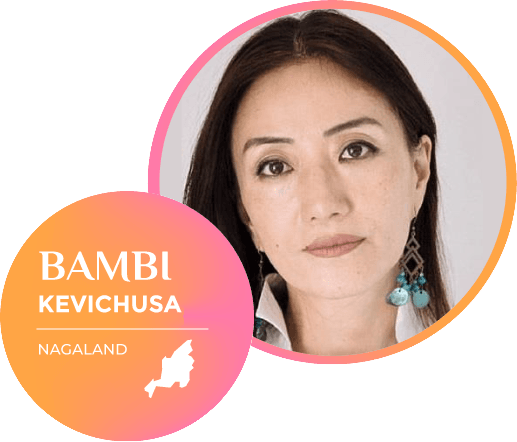
Bambi Kevichusa is a fashion designer from Nagaland, renowned for her expertise in bridal wear. She trained at the Royal Melbourne Institute of Technology in Australia and has built a distinguished career spanning many years. Bambi under her label Bambi K, has crafted wedding dresses for clients across Nagaland, the North East, as well as in Europe and the United States. Her line of clothing has come from a deep burden for climate change and to see women in the rural areas benefiting from creating fabrics; and as a designer play a small and humble part is keeping the craft of handwoven fabric alive and making a small contribution as a designer towards preserving our planet. Bambi K’s work has been featured in fashion shows both in Nagaland, nationally and internationally. One of her garments is now part of the permanent collection at the Horniman Museum in London, UK.


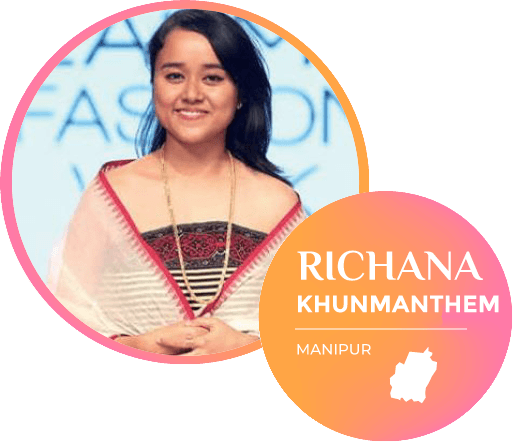
Richana Khumanthem is Creative Director of a handloom based brand, Khumanthem based in Imphal, Manipur. The brand collaborates with handloom weavers, particularly from northeast India, to showcase the region's exquisite sartorial treasures. By sharing the rich heritage, lessons, and mythical narratives intricately woven into these textiles, we aim to bring these stories to a global audience. Khumanthem also stepped up during the onset of the pandemic in 2020, by becoming the first private firm in the northeast to get certified by the GOI for manufacturing PPE Kits and providing the hospitals in the state PPE kits at a heavily subsidised rate. Richana completed her schooling in 2004 from Maharani Gayatri Devi School, Jaipur. The same year she joined NIFT, Delhi.
After receiving her Bachelor’s Degree in Fashion Design in 2010, she worked as assistant designer for Anaikka, Delhi for 6 months before leaving to prepare for her Masters. While preparing for her masters she interned in the management department at Mother’s Care Children Hospital, Imphal. She completed her Masters degree in Fashion Business & Management from NTU, Nottingham,UK in 2012. She returned in 2012 after being awarded a distinction for her thesis on ‘The Perception of Indian Luxury brand & Made-in-India tag by the global audience’. Richana worked as PR & Marketing person for Delhi based designer Niki Mahajan, until in 2013 she was recruited by NID, Ahmedabad as associate textile researcher for an IGNCA project. During her tenure at NID, she spent 4 months travelling to villages of Manipur to document the social structure, history, handloom and handicraft of the region.


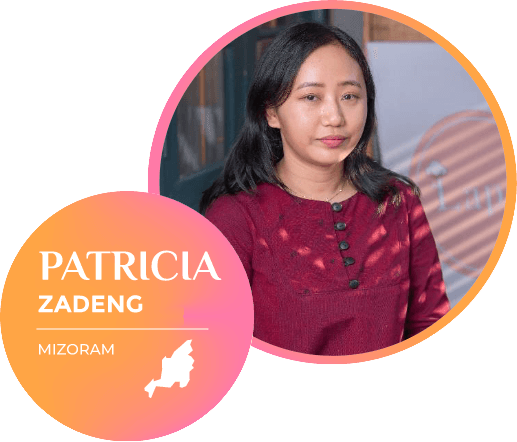
Patricia Zadeng is a textile designer from Aizawl, Mizoram. She is an alumnus of the highly esteemed National Institute of Design (NID), Ahmedabad. During her time there, she interned under the acclaimed fashion designer Rahul Mishra at Noida where she contributed to his Spring-Summer collection for Paris Fashion Week 2014. She also did her graduation project under Maku, a Kolkata- based textile brand and helped in developing their first natural indigo saree collection using jamdani weaving technique.
After graduating in 2016, she went back to Mizoram and was part of a government project to help train Mizo weavers. Once the project was over, she furthered her studies by undertaking a six-month pattern-making course at NIFT, Mumbai.
In 2017, she started exploring possibilities with developing products from Mizoram. There is a problem with the textiles market in Mizoram in that only synthetic fibres are used and products of export value are not manufactured. She aspired to solve this. Also, she has a deep passion to uplift female weavers and to preserve Mizo culture. For all these she came up with a contemporary textile brand to introduce quality items with natural fibres, which can be exported as well to other states and countries.



Daniel Syiem, the Co-founder of Daniel Syiem’s Ethnic Fashion House, is based in Shillong and has been working with the weavers of Ri-bhoi district, Meghalaya for more than a decade. His passion for‘ Fashion with a Cause’ led him to start the Fashion House with Co-founder Ms.Janessaline Pyngrope. Their aim was to help revive, promote and protect their indigenous fabric “Ryndia “. Back then not much was being done to promote this fabric and weaving among the women folk was becoming a dying art form. The duo’s dream was to use fashion as a medium to tell a story about this unique fabric intertwining different elements of their culture and tradition and telling the world about their people.
For more than a decade they have travelled the world showcasing their “Ryndia” collections at various national and international Fashion Weeks and events from New-York, Paris, Milan,Toronto,Tokyo,London,Rome,Singapore, Thailand and also presented their works at some of the most prestigious institutions like The Nehru Centre, London, The World Intellectual Property Organization, Geneva and IFFAD, Rome. Besides Fashion, Daniel also has a love for Food and Fitness and has a deep passion towards the upliftment of his society especially for the youths.


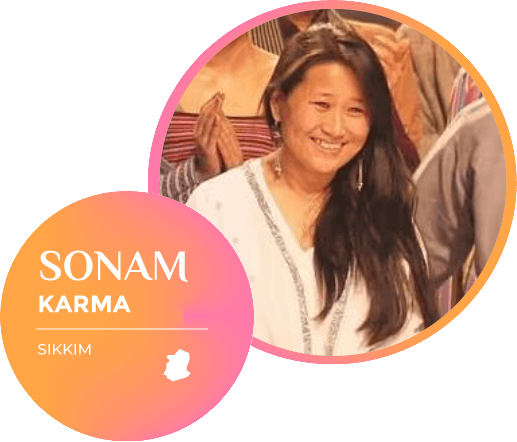
Karma Sonam Bhutia, a 33- year -old textile designer, has an infectious passion for nettle-weaving. Sikkimese by birth, she grew up largely in Rajasthan and Delhi, but now lives in Gangtok and is working to revive the traditional textiles of her home state. Nettle-weaving is a high point of the multidimensional textile work in her ongoing project, Kuzo, which means body in Sikkimese.
One of the many species of nettle, plentiful in the region, is the Himalayan variety. The plant has been a source of fibre for centuries; the stem is cut, the bark removed and peeled, and the fibre extracted. In countries like Nepal, where nettle -weaving is common, it is traditionally converted into cordage for string, ropes and fishing nets. It is also spun into yarn for garments, mats, bags or blankets, either in its natural colour of brown -green straw or blended with ramie, cotton and wool.


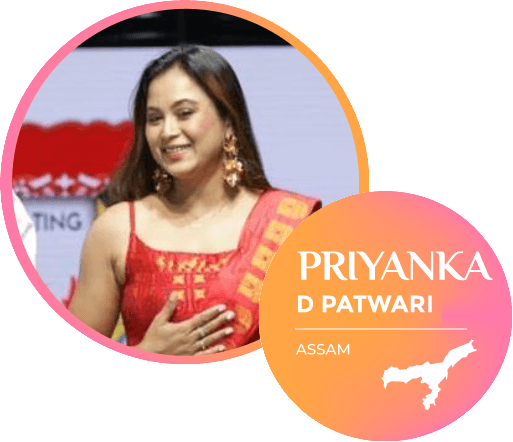
Priyanka D Patwari, the creative force behind Ugha Ethnics, a celebrated ethnic wear brand rooted in the cultural tapestry of Guwahati, Assam. Founded in 2014, Ugha Ethnics specializes in crafting Mekhela Sador, adorned with exquisite details that reflect the rich heritage and traditions of the region. Priyanka's designs seamlessly blend tradition with contemporary aesthetics, offering a unique and captivating allure to her creations. Through her passion for preserving and promoting Assamese craftsmanship, Priyanka has carved a distinctive niche in the world of fashion, captivating enthusiasts with her artistry and innovation.



Jyotsana Dev Verman, representing the state Tripura at the 19th edition festival celebrating north east India. She come from a diverse family. Her spirit is rooted in the north east. Theres an undeniable strength in the resilience of our people and the rich culture that must be explored and preserved.
preserved. She graduated from Lady Sri Ram college in New Delhi and went on to pursue a masters degree in fashion in Milan, Italy. From there on, my journey includes internships and work with various designers, culminating in the launch of my own label.
She worked with a blend of handcrafted textiles from Tripura and modern day raw materials, to produce pieces that relate to contemporary times. Moreover, all her accessories are hand made by her and her team with traditional Tripuri beads.

Hi, I'm Purvi
